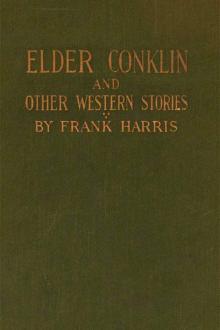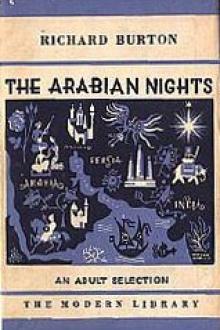Elder Conklin - Frank Harris (i am malala young readers edition .TXT) 📗

- Author: Frank Harris
- Performer: -
Book online «Elder Conklin - Frank Harris (i am malala young readers edition .TXT) 📗». Author Frank Harris
“I only called you out to give you a chance of kissin’ Loo Conklin.”
He thought it wiser not to reply to this, and contented himself with thanking her as they entered the room. He paused before Miss Conklin, and gave her “bumpkin,” adding, by way of explanation, “a rude country fellow.” She spelt it cheerfully, without the “p.” When the mistake was made plain to her, which took some little time, she accepted his arm, and went with him into the passage. He kissed her more than once, murmuring, “At last, Miss Loo!” She replied seriously:
“See here! You’re goin’ to get into a fuss with Seth Stevens if you call me out often. And he’s the strongest of them all. You ain’t afraid? O.K. then. I guess we’ll pay him out for lyin’.”
On returning to the room, Bancroft became conscious of a thinly veiled antagonism on the part of the young men. But he had hardly time to notice it, when Miss Loo came in and said to him demurely, “Loo.” He spelt “You.” Much laughter from the girls greeted the simple pleasantry.
So the game, punctuated by kisses, went on, until Miss Loo came in for the fourth time, and stopped again before Bancroft, whereupon Seth Stevens pushed through the crowd of young men, and said:
“Miss Loo Conklin! You know the rule is to change after three times.”
At once she moved in front of the stout youth, Richards, who had come forward to support his friend, and said “liar!” flashing at the same time an angry glance at Stevens. “Lire,” spelt Richards painfully, and the pair withdrew.
Bancroft went over to the men’s corner; the critical moment had come; he measured his rival with a glance. Stevens was tall, fully six feet in height, and though rather lank, had the bow legs and round shoulders which often go with strength.
As he took up his new position, Stevens remarked to a companion, in a contemptuous drawl:
“Schoolmasters kin talk an’ teach, but kin they fight?”
Bancroft took it upon himself to answer, “Sometimes.”
“Kin you?” asked Stevens sharply, turning to him.
“Well enough.”
“We kin try that tomorrow. I’ll be in the lot behind Richards’ mill at four o’clock.”
“I’ll be there,” replied the schoolmaster, making his way again towards the group of girls.
Nothing further happened until the old folk came in, and the party broke up. Driving homewards with Miss Conklin, Bancroft began:
“How can I thank you enough for being so kind to me? You called me out often, almost as often as I called you.”
“I did that to rile Seth Stevens.”
“And not at all to please me?”
“Perhaps a little,” she said, and silence fell upon them.
His caution led him to restrain himself. He was disturbed by vague doubts, and felt the importance of a decisive word. Presently Miss Conklin spoke, in a lower voice than usual, but with an accent of coquettish triumph in the question:
“So you like me after all? Like me really?”
“Do you doubt it?” His accent was reproachful. “But why do you say ‘after all’?”
“You never kissed me comin’ back from church last Sunday, and I showed you the school and everythin’!”
“Might I have kissed you then? I was afraid of offending you.”
“Offendin’ me? Well, I guess not! Every girl expects to be kissed when she goes out with a man.”
“Let’s make up for it now, Loo. May I call you Loo?” While speaking he slipped his arm round her waist, and kissed her again and again.
“That’s my name. But there! I guess you’ve made up enough already.” And Miss Conklin disengaged herself. On reaching the house, however, she offered her lips before getting out of the buggy.
When alone in his bedroom, Bancroft sat and thought. The events of the evening had been annoying. Miss Loo’s conduct had displeased him; he did not like familiarity. He would not acknowledge to himself that he was jealous. The persistent way Stevens had tried to puzzle her had disgusted him—that was all. It was sufficiently plain that in the past she had encouraged Stevens. Her freedom and boldness grated upon his nerves. He condemned her with a sense of outraged delicacy. Girls ought not to make advances; she had no business to ask him whether he liked her; she should have waited for him to speak plainly. He only required what was right. Yet the consciousness that she loved him flattered his vanity and made him more tolerant; he resolved to follow her lead or to improve upon it. Why shouldn’t he? She had said “every girl expects to be kissed.” And if she wanted to be kissed, it was the least he could do to humour her.
All the while, at the bottom of his heart there was bitterness. He would have given much to believe that an exquisite soul animated that lovely face. Perhaps she was better than she seemed. He tried to smother his distrust of her, till it was rendered more acute by another reflection— she had got him into the quarrel with Seth Stevens. He did not trouble much about it. He was confident enough of his strength and the advantages of his boyish training in the gymnasium to regard the trial with equanimity. Still, the girls he had known in the East would never have set two men to fight, never—it was not womanly. Good girls were by nature peacemakers. There must be something in Loo, he argued, almost— vulgar, and he shrank from the word. To lessen the sting of his disappointment, he pictured her to himself and strove to forget her faults.
On the following morning he went to his school very early. The girls were not as obtrusive as they had been. Miss Jessie Stevens did not bother him by coming up every five minutes to see what he thought of her dictation, as she had been wont to do. He was rather glad of this; it saved him importunate glances and words, and the propinquity of girlish forms, which had been more trying still. But what was the cause of the change? It was evident that the girls regarded him as belonging to Miss Conklin. He disliked the assumption; his caution took alarm; he would be more careful in future. The forenoon melted into afternoon quietly, though there were traces on Jake Conklin’s bench of unusual agitation and excitement. To these signs the schoolmaster paid small heed at the moment. He was absorbed in thinking of the evening before, and in trying to appraise each of Loo’s words and looks. At last the time came for breaking up. When he went outside to get into the buggy—he had brought Jack with him—he noticed, without paying much attention to it, that Jake Conklin was not there to unhitch the strap and in various other ways to give proof of a desire to ride with him. He set off for Richards’ mill, whither, needless to say, Jake and half-a-dozen other urchins had preceded him as fast as their legs could carry them.
As soon as he was by himself the schoolmaster recognized that the affair was known to his scholars, and the knowledge nettled him. His anger fastened upon Loo. It was all her fault; her determination to “pay Stevens out” had occasioned the quarrel. Well, he would fight and win, and then have done with the girl whose lips had doubtless been given to Stevens as often and as readily as to himself. The thought put him in a rage, while the idea of meeting Stevens on an equality humiliated him— strife with such a boor was in itself a degradation. And Loo had brought it about. He could never forgive her. The whole affair was disgraceful, and her words, “Every girl expects to be kissed when she goes out with a man,” were vulgar and coarse! With which conclusion in his mind he turned to the right round the section-line, and saw the mill before him.
*
After the return from the house-warming, and the understanding, as she considered it, with Bancroft, Miss Loo gave herself up to her new-born happiness. As she lay in bed her first thought was of her lover: he was “splendid,” whereby she meant pleasant and attractive. She wondered remorsefully how she had taken him to be quite “homely-looking” when she first saw him. Why, he was altogether above any one she knew—not perhaps jest in looks, but in knowledge and in manners—he didn’t stand in the corner of the room like the rest and stare till all the girls became uncomfortable. What did looks matter after all? Besides, he wasn’t homely, he was handsome; so he was. His eyes were lovely—she had always liked dark eyes best—and his moustache was dark, too, and she liked that. To be sure it wasn’t very long yet, or thick, but it would grow; and here she sighed with content. Most girls in her place would be sorry he wasn’t taller, but she didn’t care for very tall men; they sorter looked down on you. Anyway, he was strong—a pang of fear shot suddenly through her—he might be hurt by that brute Seth Stevens on the morrow. Oh, no. That was impossible. He was brave, she felt sure, very brave. Still she wished they weren’t going to fight; it made her uneasy to think that she had provoked the conflict. But it couldn’t be helped now; she couldn’t interfere. Besides, men were always fightin’ about somethin’ or other.
Mr. Crew, the Minister, had said right off that he’d make his mark in the world; all the girls thought so too, and that was real good. She’d have hated a stupid, ordinary man. Fancy being married to Seth Stevens, and she shuddered; yet he was a sight better than any of the others; he had even seemed handsome to her once. Ugh! Then Bancroft’s face came before her again, and remembering his kisses she flushed and grew hot from head to foot. They would be married soon—right off. As George hadn’t the money, her father must give what he could and they’d go East. Her father wouldn’t refuse, though he’d feel bad p’r’aps; he never refused her anythin’. If fifteen hundred dollars would be enough for George alone, three thousand would do for both of them. Once admitted as a lawyer, he would get a large practice: he was so clever and hard-working. She was real glad that she’d be the means of giving him the opportunity he wanted to win riches and position. But he must begin in New York. She would help him on, and she’d see New York and all the shops and elegant folk, and have silk dresses. They’d live in a hotel and get richer and richer, and she’d drive about with—here she grew hot again. The vision, however, was too entrancing to be shut out; she saw herself distinctly driving in an open carriage, with a negro nurse holding the baby all in laces in front, “jest too cute for anythin’,” and George beside her, and every one in Fifth Avenue starin’.
Sleep soon brought confusion into her picture of a happy future; but when she awoke, the glad confidence of the previous night had given place to self-reproach and fear. During the breakfast she scarcely spoke or lifted her eyes. Her silent preoccupation was misunderstood by Bancroft; he took it to mean that she didn’t care what happened to him; she was





Comments (0)